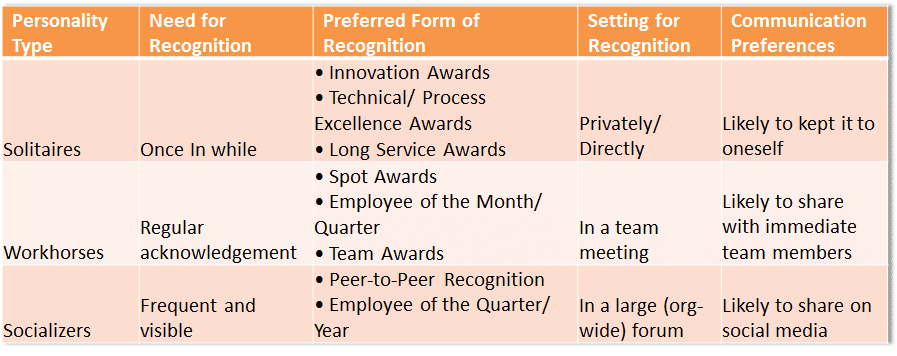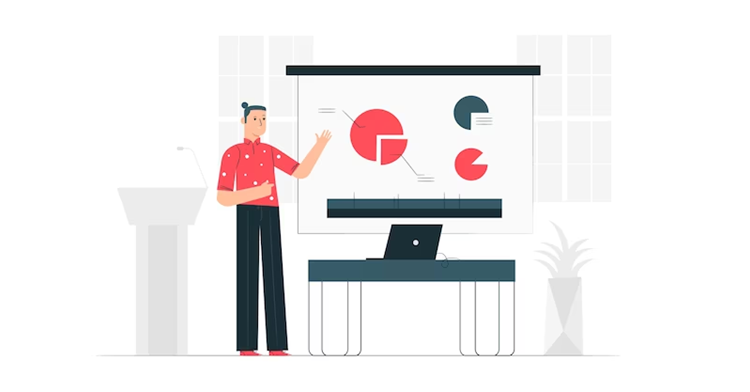1. Different employee personality types respond uniquely to recognition, making it essential to tailor recognition programs accordingly.
2. “Solitaires” prefer subtle, private recognition for their consistent, behind-the-scenes work, while “Workhorses” thrive on regular acknowledgment in team settings.
3. “Socializers” thrive with public recognition and peer appreciation, significantly boosting their productivity and morale.
4. A well-rounded recognition program should encompass various award types, recognition frequencies, and presentation methods to cater to the diverse personalities of employees, thereby enhancing both employee engagement and business success.
Each employee’s personality type reacts differently to different workplace recognition modes. Hence, it is essential to understand how recognition impacts different employee personalities to build a recognition program that effectively combines and matches various forms of recognition with varying types of personality.

Every workplace has a diverse mix of employee personality types, each with its unique working style, behaviors, habits, and preferences.
Employees of different personality types respond differently to employee rewards and recognition programs.
Here are the most common employee personality types and how they respond to recognition:


This type of employee generally prefers to operate solo rather than in a group. They do not like to socialize much and even when they take up leadership roles, they prefer operating solo.
Such employees are less likely to feel comfortable in a hyper-social environment, which might impact their efficiency and productivity.
They tend to do well in roles that involve a significant component of individual contribution or working in smaller teams rather than collaborating with a large group of coworkers.
Information Technology, Business Research, Analytics, Finance

They often prefer to work behind the scenes and are passionate about their work.
They are steady and persistent, producing quality work without requiring frequent recognition.
Their names might not crop up too many times on the company’s digital recognition platform although they like to be appreciated by their managers once in a while for their often flawless work.
However, this, too, needs to be done subtly with minimal publicity and social fanfare to avoid embarrassing them.
– Innovation Awards
– Technical/ Process Excellence Awards
– Long Service Awards
– Recognition in private/ directly

This type of employees are usually high achievers as they constantly strive for excellence in everything that they do. They are generally well-organized, reliable, and consistent in their performance at work and have strong work ethics.
These employees work well in team environments and bring the team along with them. They collaborate effectively with coworkers and contribute to driving the team’s effectiveness.
Customer Service, Operations, Administration, Facilities

Although typically self-motivated, they appreciate being acknowledged by their supervisors occasionally for their contributions and achievements at work.
Regular recognition can boost their motivation and help their performance to the next level.
The best method of employee recognition for such employees is to appreciate their efforts and achievements during team meetings.
They should also have opportunities to advance their career goals, express their opinions, and take on challenging roles and projects.
– Spot Awards
– Employee of the Month/ Quarter
– Team Awards
– Recognition in the presence of the team

This type of employee is generally a natural leader. They like to connect with others at the workplace. They like to be part of large teams and lead them or play significant roles in them.
Socializers typically spread positivity and work well in team settings.
Hence, they excel in roles where their achievements can bring them visibility within the team or the organization.
They are generally well-connected and famous in the workplace.
Sales, Marketing, Human Resources

Recognizing such employees publicly boosts their productivity and efficiency significantly. Hence, individual recognition works best for them rather than being recognized as part of a team.
Also, these employees feel motivated when their coworkers recognize them. So, they like receiving peer appreciation on the company’s employee recognition platform.
Organizations should also appreciate such employees for their positivity, for making the workplace lively and engaging, and for their on-the-job performance.
– Peer-to-Peer Recognition
– Employee of the Quarter/ Year
– Recognition in a large forum
It is quite clear that different employee personalities have different needs and preferences for recognition. Hence, organizations need to develop a broad framework for employee recognition that caters to these different personality types.
Here are a few best practices that organizations can consider while formulating their employee rewards and recognition programs:
Learning about how recognition impacts different employee personalities can be quite crucial for developing a balanced employee recognition framework to create a highly productive and dedicated workforce, which in turn can enhance business growth and success significantly.

Lead author: Sagar Chaudhuri, the Co-Founder and CEO of HiFives. He is an HR Tech Evangelist with over 25 years of experience in both corporate and entrepreneurial settings. Previously, Sagar has held leadership roles with companies such as Genpact, Infosys, and ICICI Bank. He has an engineering degree from IIT Kharagpur and an MBA from IIM Lucknow. Connect on LinkedIn
To stay updated on the latest HiFives blogs, follow us on Twitter (@MyHiFives)